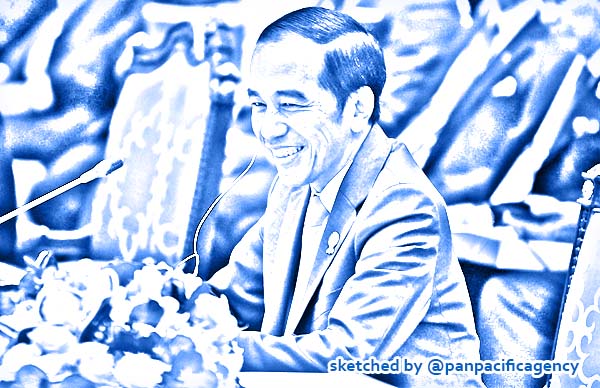Jokowi’s visit to Australia strengthens trade cooperation: Minister

President Joko 'Jokowi' Widodo has held several meetings with senior members of the rival Democratic Party and National Mandate Party (PAN) since the April 17 elections, leading to speculation about his efforts to build a supermajority coalition. (Antara Photo/Puspa Perwitasari). Sketched by the Pan Pacific Agency.
JAKARTA, Feb 11, 2020, ANTARA. President Joko Widodo’s (Jokowi) visit to Canberra, Australia, after completion of the ratification of the Indonesia-Australia Comprehensive Economic Partnership Agreement (IA-CEPA), would strengthen trade cooperation between both countries, Minister of Trade Agus Suparmanto stated. “The important point is the President of Indonesia comes to Australia at the right time after the IA-CEPA ratification process in the House of Representative of Republic Indonesia has been completed by the two countries,” Minister Suparmanto said in a statement received in Jakarta, Monday, ANTARA reported.
In addition, President Jokowi’s working visit also marks the strengthening of bilateral relations between Indonesia and Australia, which had already reached 70 years.
With the IA-CEPA ratification done, the two countries have agreed on a clear roadmap so that bilateral relations in the next five years, especially trade, will be strengthened and mutually beneficial.
“This is certainly a milestone that must be conveyed to the people of Indonesia that through the IA-CEPA, market access will be open and increase Indonesia’s exports to Australia,” he said.
A total of 6,474 tariff posts on Indonesian export products will become zero percent when the IA-CEPA is implemented and there will be no more trade barriers for Indonesian exports in the Australian market.
Therefore, Indonesian export products are expected to be competitive and stronger in the global market. Meanwhile, Indonesia will eliminate 94.5 percent (10,229 tariff posts) in 2020.
Indonesia’s main products being targeted for increased exports are TPT, carpets/rugs, furniture from wood, and automotive and spare parts.
Other potential products for export development are ethylene glycol, ethylene polymer sheets, distribution pipes for oil and gas, herbicides and pesticides, electronic equipment, machinery, rubber and its derivatives (such as car tires), coffee and processed coffee, cocoa/chocolate food and beverage, and paper and paper products.
“The export target is one of Indonesia’s main strategies in reducing the trade balance deficit and in line with efforts to increase Indonesia’s exports and investment in Australia and globally. The two countries can also strengthen the economic powerhouse,” the trade minister explained.